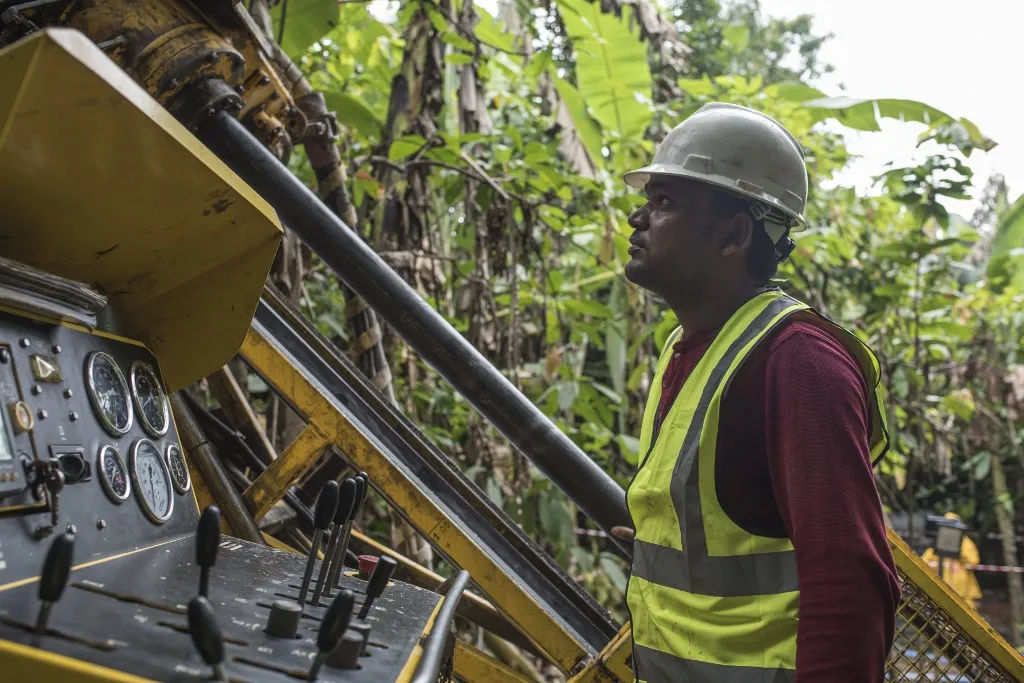
For Nigerian president Bola Tinubu, the October 18 sod-turning ceremony for a $250m lithium battery factory by a Chinese investor was both symbolic and pivotal. It was a chance to signal the government’s switch to solid minerals, rather than petroleum, as the bulwark of the Nigerian economy. It was also an opportunity to serve notice that Nigeria would no longer be a mere exporter of raw materials.
Though better known in the past five decades as a petroleum exporter, Nigeria has deposits of more than 40 different minerals, according to the country’s Geological Survey Agency.
In 2018, the agency embarked on an aggressive mapping of some key mineral deposits including lithium, gold, bitumen, barite, coal, tin and columbite (an ore of the metal niobium).
The Tinubu administration has announced a Solid Minerals Roadmap to reduce Nigeria’s oil dependence through the exploitation of these resources.
The primary objective, according to Dele Alake, the solid minerals development minister, is to provide accurate mining data, to attract local and foreign investors and optimise the industry’s contribution to the economy.
“Under this administration, we shall do everything possible to discourage the carting away of our solid minerals without value addition,” Alake said at the lithium-battery factory ceremony.
In the aftermath of the global energy crisis in the early 1970s, Nigeria formed a state energy company, nationalised the majority stake in key energy ventures and became a petro-dollar state. Petroleum drowned out all other export products as the country’s political elite fed on the oil boom for as long as it lasted.
Related articles
Minerals attracted the colonists
Mining riches were among the attractions Nigeria had as a colony to Britain, besides agricultural exports. Particularly important, early in the 20th century, were the coal in the southeast and the tin and columbite in the central region.
Two almost parallel railway lines were built by the colonial government, one on the eastern flank and the other on the western, running from the north to the southern coastal ports, to carry agricultural and mineral exports to Europe.
That backbone of the colonial economy was discarded while oil reigned. A reality check was only induced in the political elite by the restiveness that erupted in the oil-rich southern Delta region in the past two decades, severely crimping oil production. From a peak of 2.6m barrels per day reached in the late 1990s, the country’s output reached a record low of about 1m barrels per day in September 2022, according to the CEIC Data service. The country needs to produce at least 2.2m barrels per day to balance its budget.
Faced with these circumstances and unable to resolve them, Tinubu’s predecessor, Muhammadu Buhari, thrived on borrowing. Left with a humongous debt burden and little room to borrow more, Tinubu’s immediate option would’ve been to boost revenue by restoring oil output to the old levels.
But there appears to be little prospect of that. Most onshore oil fields are hampered by a combination of armed violence, sabotage and oil theft that authorities acknowledge is abetted at top levels in the security services and the industry. Nigeria has been unable to meet its OPEC quota of 1.8m barrels per day. Crude output did rise to 1.3m barrels per day in September but still falls short.
A government in a hurry
Confronted with a seemingly intractable situation in the oil industry, the government appears in a hurry to strike out in a different direction. And the mining sector appears to be offering attractive possibilities. It’s a task that Tinubu has given to Alake, one of his most trusted aides for more than two decades.
Tinubu chose the Nigerian Economic Summit, an annual gathering of private sector leaders and policymakers in the capital, Abuja, on 23 October to acknowledge the harm the economy is facing as a result of past fiscal and monetary failings. Particularly burdensome is some $10bn in outstanding funds that are either due for repatriation to investors or unsettled letters of credit. These have made many foreign investors even more wary of Nigeria.
“I assure you we have a line of sight to the foreign exchange we need to refloat this economy,” Tinubu told the gathering of private sector leaders. “And we will get it,” he added. He expected enough investments to turn Nigeria into a trillion-dollar economy within the next three years.
Mining is one of the key sectors being primed for this purpose. Government officials tout the $250 million investment announced by Chinese company Ganfeng Lithium Group as an example of its deal-making acumen and a template for future mining deals that will require value-added exports of raw materials.
The Chinese company won where the US electric car maker Tesla had failed. Last year, that company, owned by the world’s richest man, Elon Musk, sought lithium mining rights in Nigeria, according to the solid minerals ministry. The talks fell through because Nigeria insisted the company must set up a battery production plant in the country.
Now the Chinese factory, on completion, will process 18,000 tons of lithium daily and aim for an annual output of 4.5m tons, according to Ganfeng Lithium Group president Pan Quen. This will translate into 2,500 direct jobs and 15,000 indirect jobs. More Chinese companies are keen to follow his example in Nigeria, Pang says.
Canada joins China at the mineral buffet
Interest has also come from Canada, with Orosur Mining, a Toronto-based company with an established footprint in South America, announcing on 16 October that it had obtained rights to mine for lithium in four sites in Nigeria.
It’s “a continuation of the company’s strategy of securing high-quality mineral exploration opportunities in key jurisdictions worldwide,” chairman Louis Castro said in Abuja.
In some official quarters in Nigeria lithium is now being viewed as the new oil, after its price per ton jumped from about $6,000 in 2020 to $78,000 in 2022. What’s more, the lithium found in Nigeria is of a high grade, with as much as 13% lithium oxide in some cases. Concentrations of 0.4% are considered exploitable, according to Andulrazaq Garba, director general of Nigeria’s Geological Survey Agency.
Generous incentives have been laid out for mining investors, including a five-year tax holiday, deferred royalty payments, duty exemptions on plant and machinery and 95% capital allowances.
How to avoid past mistakes
Yet some analysts worry that in the hurry to replace oil with other mining the same old mistakes that led to violence and disruptions may be repeated. Most of these stem from denying the benefits of the mining to the immediate communities. Poor regulation often leads to environmental degradation, further breeding anti-industry resentment, according to Charles Asiegbu, an analyst for Lagos-based research company, Nextier Group.
The growing demand for lithium could attract illegal resource extractors, who are likely to bring violence and conflict, Asiegbu says, citing the example of Zamfara State in the northwest, where illegal gold mining is the prime driver of deadly violence often described as “banditry”. Such a situation can only be avoided by proper regulation and strict supervision, which Nigeria must do “quickly to seize the opportunities from this new commodity,” he says. Minister Alake insists that the administration’s plans will take care of such concerns. “The roadmap emphasises sustainable practices through training artisanal miners and having processing centres,” he says. “It balances development with environmental responsibility.”






Recent Comments